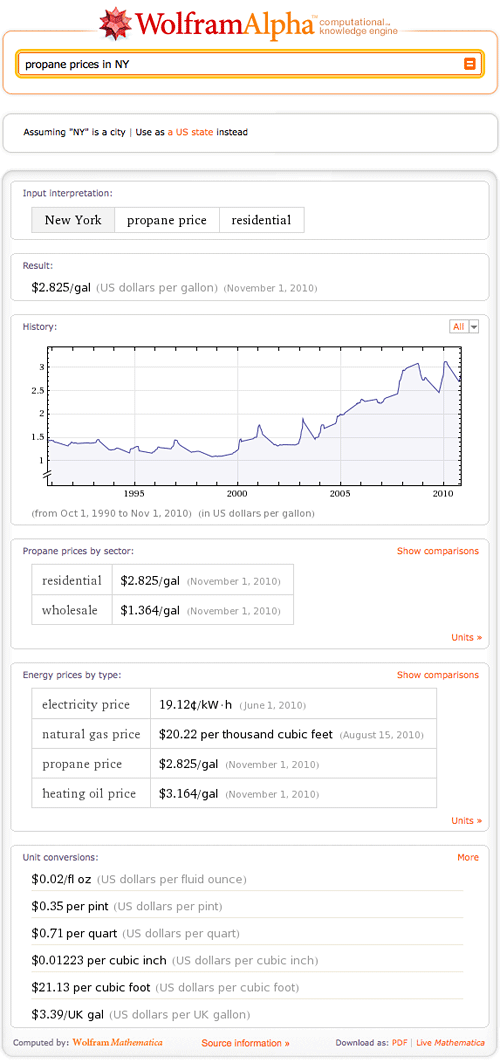 11
11
As we bid adieu to 2010, we want say thank you to all of our loyal blog readers and commenters. Today we’re taking a look back at some of 2010’s most popular Wolfram|Alpha Blog posts. 2010 was a year full of product releases, such as Wolfram|Alpha Widgets and new data for everything from movies to taxes.
These selections are only highlights of the topics we’ve covered in 2010. If you’re feeling really nostalgic, or if you’re new to the Wolfram|Alpha Blog, we invite you to read more in the archives.
Just in time to tackle a common New Year’s resolution, we released “New Physical Activity Data in Wolfram|Alpha”.
After reading “Computing Valentine’s Day with Wolfram|Alpha”, there was little doubt that we speak math, the universal language of love.
Ever wonder which country consumes the most coffee or sugar? In March, we introduced new data that answers these questions in the post “Food for Thought: Consumption Patterns from Around the World”.
In April we were excited to finally be able to share “Stephen Wolfram’s TED Talk: Computation Is Destined to Be the Defining Idea of Our Future”. The inspirational video quickly became a web favorite.
May:
Where did the time go? In May we celebrated Wolfram|Alpha’s first birthday with the post “Wolfram|Alpha: The First Year”.
June:
Just in time for family reunion season, we published “My Cousin’s Cousin’s Niece’s Grandfather Said to Just Ask Wolfram|Alpha”, to help you identify all of those branches on the family tree.
July:
In July we shared “Ask Wolfram|Alpha about Medical Drug Treatments” to introduce a new functionality in Wolfram|Alpha that allows you to compare how your medical conditions and treatment plans compare to those of other patients.
Kids say the darnedest things. In the post “10 Fun Questions Kids Can Answer with Wolfram|Alpha”, we took a look at how Wolfram|Alpha can help you and your little one answer common curiosities. More »
 8
8
As temperatures start falling across the U.S., many of us are looking more closely at our home heating and energy bills, wondering how much they might go up this winter. Wolfram|Alpha can’t yet predict the future, but now it can help you explore historical and recent energy-price trends in most U.S. states, thanks to data from the U.S. Energy Information Administration (EIA).
Ask Wolfram|Alpha about “heating oil prices in New York”, for example, and you’ll see that as of November 1, the statewide average price was about $3 per gallon—slightly higher than at the start of last winter, but quite a bit below the peak in late winter of 2008. Propane prices are also higher than a year ago, and you can also see that prices climbed dramatically over the course of last winter. You can keep checking back over the course of the season to see which way prices are trending in your state.
(Note that the jagged appearance of heating oil and propane plots is due to the fact that prices are only reported for part of the year; these prices are also reported for only about 20, mostly northern, U.S. states.)
You can also ask Wolfram|Alpha about natural gas and electricity prices. The EIA keeps these figures less up to date than figures for heating oil and propane, but you can clearly see long-term price trends and seasonal fluctuations for both of them. More »
 1
1
On August 2, The New York Times reported that the (near) final estimate for the total amount of oil leaked into the Gulf of Mexico as a result of British Petroleum’s (BP) Deepwater Horizon drilling accident is approximately 4.9 million barrels. It would be nice to understand what this number means in the context of the commodity markets where oil is traded. It would also be nice to better understand what this oil spill did to BP stockholders.
Wolfram|Alpha can help answer these questions. For example, someone might wonder what all this oil would be worth on the oil market. The input “price of 4.9 million barrels of oil” tells us that the value of this oil on the oil futures market is around $398.8 million (at the time this was written). That’s a lot of money just floating around the Gulf! But to be fair, much of it was cleaned up. Wolfram|Alpha also shows a graph of how the value of this oil has fluctuated over time as well as the latest quote of a barrel of oil on the New York Mercantile Exchange.
Someone might wonder whether the amount of spilled oil was enough to affect the price of oil in the U.S. The input “oil futures open interest” gives us the number of oil futures contracts currently in existence for the front-month contract. 
As the graph illustrates, open interest starts out strong every month (as the front-month contract rolls forward to the next month). As the contract approaches expiration, some people close out their positions while others roll their positions forward into a future month’s contract. The best measure of open interest would be the higher numbers shown immediately after the front-month rolls forward (especially since other contract months aren’t accounted for here).
More »



